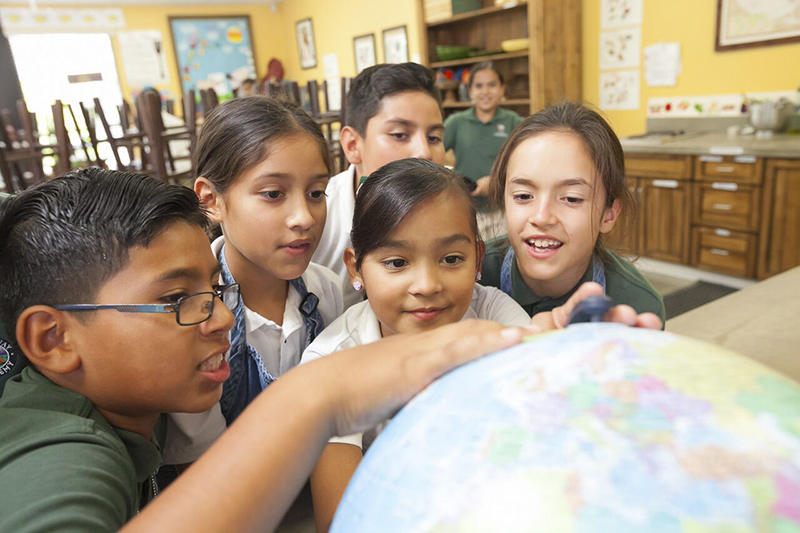
Six years ago, Grimmway Schools in California’s Central Valley launched a new learning model blending academics, nutrition and wellness in the education of youth underserved rural communities. Today, with edible schoolyards and kitchens as part of the educational experience, Grimmway Schools is a growing network of high-performing K-8 college-prep charter schools in Kern County, a core region for California’s agricultural industry.
Following the first K-8 school in Arvin, which opened in 2011 and has been named a California Distinguished School by the state’s Department of Education, the second Grimmway school opened in September in Shafter with grades K-4; it is is projected to grow to 700 students in grades K-8 by 2021. In opening the Shafter facility, Paul Escala, executive director of Grimmway Schools, said: “Today we celebrate a harvest – a new school has grown in this great field. We seek to provide a rigorous college preparatory academic program where health, wellness and nutrition are at the center of a child’s education. And by doing so, we will close the Achievement Gap for every student who enters through our doors.”
Grimmway Arvin has shown a 52-point increase in academic success rates, doubled the percentage of English Language Learning Learners earning “Early Advance” or “Advanced” recognition, demonstrated accelerated growth in student reading and math and maintained a high student retention rate.
Applying the pioneering vision of Chef Alice Waters and the Edible Schoolyard Project in Berkeley, California, the wholly integrated organic garden and kitchen classroom are fundamental to Grimmway Academy’s commitment to improve the health of the entire community by teaching students and their families ways to establish and maintain lifelong healthy eating habits. The hands-on garden and kitchen experience links to classroom learning, where math problems equal measuring compost and square footage and science applies resourceful irrigation strategies and the chemical properties of seasoning food.
What’s more, as part of their “Mutual Promise,” 90% of parents – most of whom are not college educated – participate in regular parent-teacher conferences and complete 30 or more volunteer hours each year. And, as a result of the Edible Schoolyard experience for all 700 students, early research illustrates an upward trajectory in positive eating habits adopted by students and influencing their families.
New Possibilities for Rural Underserved Families
Grimmway Academy, an idea originating with Grimmway Enterprises (inventors of bite-size”baby carrots”), plans to replicate its free public charter school system through a combination of public funding and private philanthropy. Each school starts with through a combination of public tax-exempt bonds paid through the school’s operating budget and state lease reimbursement funds. New schools are financially self-sufficient within two years.
The community of Shafter is typical of the regional demographics:
- 94% of all students in the three elementary school and one junior high are Hispanic or Latino students; 47% are English-learners.
- 37% of students in Shafter’s public schools are proficient in English-language arts and 54% in math.
The Shafter school’s 8-acre campus, with flexible high-tech classrooms, was developed completely with local contractors, architects, engineers and subcontractors and has nearly an acre of garden space. Grimmway Schools’ philosophy combines two critical challenges facing rural primarily Latino communities, where farm work and factory produce processing are part of daily life but not necessarily of healthy food habits. By finding practical applications for learning, students not only develop nutritious lifestyles but take these tools home to their families, influencing current and future eating habits tied to reducing obesity and other diet-related illness and promoting fresh, unprocessed meal selections.
As part of their curriculum, students rotate through the kitchen and garden classrooms in the same manner as academic classes, engaging their senses and opening their minds both to their core academic subjects and to the world around them. Curriculum links are made to cultures and civilizations by exploring staple foods and cooking methods. Students learn history by churning butter and grinding their own wheat and corn into flour. They plan menus in anticipation of the crops they planted themselves, better understanding nature, science and math by examining the structure of a fava bean or counting seeds in a cherry tomato. They practice the principles of ecology as they reuse, recycle and compost. Values intrinsic in edible education also include environmental stewardship, collaboration and cooperation, seasonality, active learning and nourishment.
Early evidence from Grimmway Academy Arvin is informing research studies involving Cal State Northridge and other education and healthcare partnerships. Through a parent survey of 4th and 5th graders at the Arvin school, staff found that 90% of them desired to learn and make healthy decisions and 77% had made changes in the health of their household as a result of their Grimmway experience.

